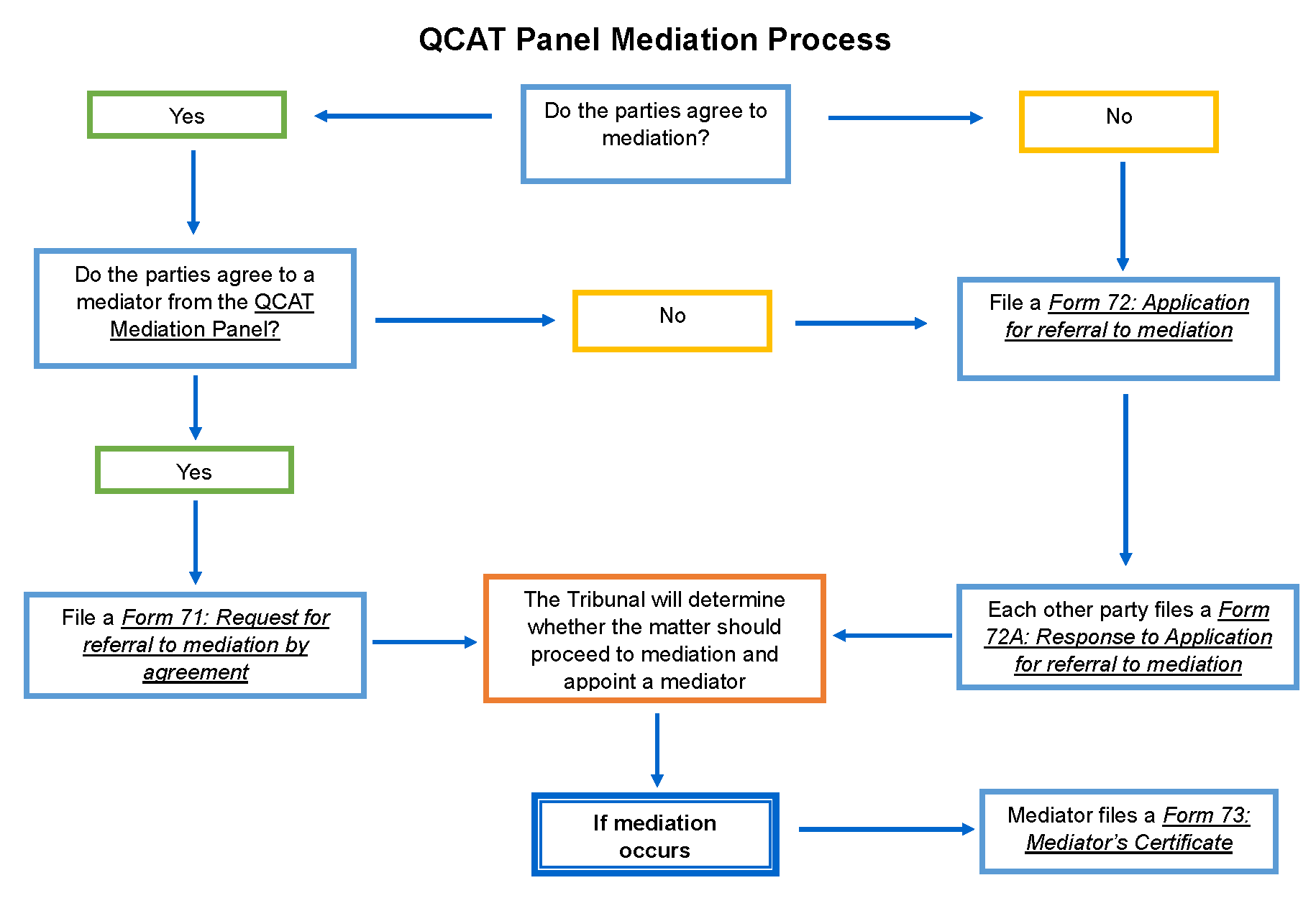QCAT has established a Panel of external, legally qualified, nationally accredited mediators who may be able to mediate your dispute.
This page contains general information to help you understand what a QCAT Panel Mediation is and how you can apply for one.
The types of disputes most suitable for mediation include:
- Anti-discrimination complaints
- Body corporate disputes
- Building disputes
- Manufactured home disputes
- Motor vehicle consumer claims
- Tree disputes
- Retirement village disputes
- Retail Shop Lease disputes
If the parties reach an agreement, the mediator may record the terms of the agreement in writing to be signed by the parties. The parties may request that QCAT make a formal order that contains the terms of the agreement. The QCAT process usually ends at this point if an agreement has been reached.
Guide to QCAT Panel Mediations
This guide is for parties who want to go to mediation conducted by a member of the QCAT Mediation Panel.
Below is a diagram of how the QCAT Panel Medition process works.

Click on the headings below for further information. A Practice Direction has also been issued to define the process for mediations conducted by a QCAT Panel Mediator: Practice Direction No 8 of 2025 - QCAT Panel Mediations.
Mediation is a flexible and confidential process that can be used to settle a dispute at any stage of the proceeding. If a matter is settled at mediation, you do not need to go to a Tribunal Hearing.
A QCAT Panel mediation involves the parties and a Mediator appointed from the QCAT Mediation Panel meeting to talk through the issues, negotiate and attempt to arrive at a mutually acceptable solution. After the mediation, the Mediator will file a Mediator’s Certificate in the Tribunal so the registry knows what the outcome of the mediation was.
The QCAT Mediation Panel comprises external, legally qualified, nationally accredited mediators. National accreditation bodies have strict requirements for accreditation. Accredited mediators have skills to ensure that the environment in which the mediation is conducted is safe and supportive, that all parties are listened to, and that you are guided through the process.
The QCAT Panel mediators have been appointed by QCAT to conduct mediations across many of the Tribunal’s civil jurisdictions.
The types of matters that are most suitable for mediation, include:
- Anti-discrimination complaints
- Body corporate disputes
- Building disputes
- Manufactured home disputes
- Motor vehicle consumer claims
- Tree disputes
- Retirement village disputes
- Retail Shop Lease disputes.
A big advantage of mediation is that it can be a much faster way of finalising your dispute. Due to increasing demands on the Tribunal’s resources, there can be considerable delay in having your matter heard and determined by the Tribunal. It is not unusual for a matter to take over a year to be listed for a hearing date, and this is after it has progressed through the Tribunal’s processes and is ready to be allocated a hearing date. Preparing for a hearing also takes time, energy and comes with the emotional cost of being involved in litigation. You may also incur significant legal cost and, even if you do not, in some circumstances you may be ordered to pay the legal costs of the other party.
If a matter is successfully resolved at mediation, you will usually be able to move on from the issues in dispute much sooner and in a more economical way than if you had continued with the matter through to a hearing. On the other hand, if your matter does not settle, you should have a better understanding of the issues in dispute and will still be able to go to a hearing.
Another advantage of mediation is that it allows you to have some control of the outcome. Unlike a hearing, where a Tribunal Member imposes an outcome, in mediation you can decide how you want to resolve the dispute and, if you are not happy with the proposed solution, you do not need to accept it.
The mediation is confidential. This can be an advantage over going to a hearing. Often hearings and the decisions made by the Tribunal are public. However, a mediation is a private matter between you and the other party.
Mediation may also help you to preserve your relationships. This is important for parties in some matters. An adversarial battle that goes all the way to a hearing can often put immense pressure on the relationship between parties. Mediation, on the other hand, helps you to focus on communicating effectively with each other to find an outcome that works for everyone and, hopefully, in a way that preserves relationships.
You can go to mediation at any stage before the matter goes to hearing. The best time to mediate will often depend on your particular matter. Generally, however, it is best to try to mediate as soon as you can. This means you will spend less time and money on the dispute and open a dialogue with the other party before one or both parties become too entrenched in a position.
There are a number of ways you can go about this.
If all parties agree to go to mediation and also agree to the mediator who will conduct the mediation, then you should file a Form 71 - Request for referral to mediation by agreement. Before doing this the parties will need to:
- refer to the list of mediators on the QCAT Mediation Panel and decide together who they would like to mediate their dispute;
- contact the Mediator to make sure they are available and willing to conduct the mediation.
If the Mediator is available and willing to conduct your mediation then you should insert the name of the mediator in the Form 71 and have each party sign the form or, if that is too difficult, have each party file their own Form 71.
Upon receipt of the Form 71, the Tribunal or Principal Registrar will then decide whether to refer the matter to mediation to be conducted by that Mediator and make appropriate directions.
If the parties either do not agree to go to mediation, or where they do agree to mediate but cannot agree on the Mediator, any party wishing to go to mediation should file a Form 72 - Application for referral to mediation. Each other party will then have five (5) business days in which to respond to the application for referral to mediation, by filing a Form 72A - Response to Application for referral to mediation.
Once these forms have been filed in the Tribunal and given to each other party, the Tribunal will determine whether or not the matter is to go to a mediation and, if so, who the Mediator should be.
The Tribunal may also decide, on its own initiative, that the matter should be referred to mediation and make directions referring it to mediation. That can be done at any time a Member may make directions, for example, at a Directions Hearing, compulsory conference or following an ‘on the papers’ review of the matter.
The mediator:
- Encourages both parties to discuss their dispute and arrive at an agreement;
- Has the parties document the agreement (where there is one) and sign it;
- Gives each party a copy of any agreement;
- Files a Form 73 – Mediator’s Certificate with the Tribunal, letting them know the outcome of the mediation and attaching a copy of any agreement in a sealed envelope.
The mediator does not provide legal advice or advocate for either party. Mediators are completely impartial and help the parties come to an agreement. Mediators are skilled at helping parties to see a way through the dispute but do not impose a solution. How the matter is resolved is ultimately a matter for the partes.
The Tribunal:
After receiving the Form 73 – Mediator’s Certificate, may make any orders or directions consistent with the outcome of the mediation, as notified by the mediator
Parties should come to mediation prepared to discuss the matter and potential ways to resolve the matter. Mediation is most successful when all parties are prepared.
Before mediation, you should:
- Ensure you know the case thoroughly, including reading all the documents that have been filed;
- Prepare the bundle of documents and evidence you will need to take with you to mediation to support your claim or respond to a claim in the mediation;
- Think about what the result might be if the case is not resolved at mediation but is instead determined by a Member or Adjudicator of the Tribunal after a hearing;
- Think about how you can negotiate to settle the case and what kinds of compromises you can make;
- Consider the cost and other impacts of pursuing your matter to a hearing;
- If you wish your legal or other representative to attend the mediation with you, you will need to inform the mediator and the other parties. You do not need leave to be represented at the mediation.
The Mediator will usually begin by explaining the process.
The process adopted by the Mediator may vary depending on the type of matter but, in general, the applicant or their representative will give a brief opening first, outlining the issues in dispute and what outcome they are seeking. Then the respondent or their representative will do the same. The Mediator may wish to talk to each party privately to get a better understanding of their perspective and may then bring the parties together to explore the issues further to help the parties reach a resolution.
The discussions between the Mediator and each party are ‘without prejudice’ which means that no relevant admissions made at mediation can be used in a hearing, should the matter go that far.
The aim is to resolve the areas of dispute or at least narrow them, and to reach an agreement that is acceptable to both parties.
The mediation will end when the parties reach an agreement. If the parties cannot reach an agreement, the mediation will end at the allotted time. The end of a mediation does not mean parties cannot continue to attempt to settle the dispute.
A mediation may also end prematurely if one of parties decides they no longer wish to participate or if the mediator decides, for whatever reason, there is no use continuing. It is very important though, in going into a mediation, a party does so in a good faith attempt to resolve the matter.
The Mediator will file a Form 73 – Mediator’s Certificate within five (5) business days of the mediation ending. The certificate lets the Tribunal know what the outcome of the mediation was so any necessary consent orders or directions can be made.
Yes, your signed agreement is a legally binding contract. The Tribunal may make orders necessary to give effect to the agreement. The parties may also have agreed to proposed orders which the Tribunal may make. These are known as ‘consent orders’, for example, that the application is withdrawn and each party is to bear its own costs.
Many mediations settle on the day or shortly after.
You may be close to settling but need more time to think things through or to get legal advice. In that case it may be helpful to adjourn the mediation to another day.
The Tribunal is not involved in this part of the process.
Who pays for the mediation will depend upon what is agreed between the Mediator and the parties, but typically both parties will pay an equal share of the Mediator’s fee. How and when this is paid is a matter for the parties and the Mediator.

